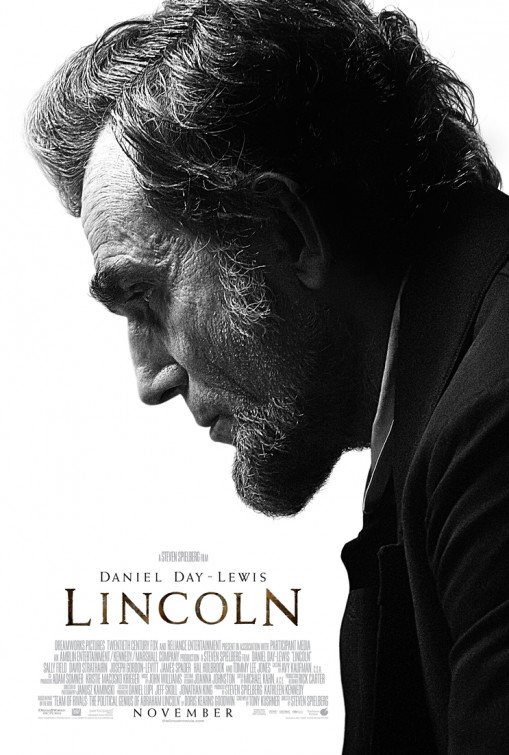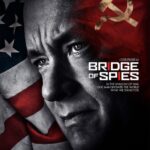The Man Behind The Amendment
Director
Steven Spielberg
Starring
Daniel Day-Lewis
Sally Field
Tommy Lee Jones
David Strathairn
This is not a biopic, nor is it a factual account of the events surrounding the abolition of slavery, it is merely a mediocre political thriller set to a historical background. And without any uncertainty to the film’s conclusion, we are left with a very cold, drab and unfeeling spectacle, culminating in little more than a heavily patriotic history lesson. In earnest, it’s not even about President Lincoln specifically, more about the actions surrounding the passing of the thirteenth amendment.. so even the title feels out of place.
1865. The US civil war is in its fourth year but many officials speculate it will be over soon, leading to a northern victory. President Abraham Lincoln [Day-Lewis] has been recently re-elected and taken it upon himself to rid the union of slavery. Despite already setting in place the Emancipation Proclamation, Lincoln fears that however the war ends this Proclamation may be dismissed as it is not an official law. So begins a four month process of bartering and negotiating with undecided State representatives under the direction of the Secretary of State, William Seward [Strathairn]. Meanwhile, we are treated to the home life in the White House and arguments in the House of Representatives between the fiery democrat Fernando Wood [Lee Pace] and fervent abolitionist Republican Thaddeus Stevens [Jones]. If I’m blunt about the matter.. nothing actually happens for a good two hours and then the bill is finally signed.
For something so important, there’s a distinctly half-arsed feeling to this entire undertaking. The utilisation of long steady shots, which can immerse and captivate an audience, only served to slow the pacing and ensure a heavy air of tedium and pomposity; I appreciate focusing audience attention was the probable reason for this but it cripples the film as a narrative piece. With every monologue a calculated speech devoid of passion or immediacy, the content of Lincoln felt like a solid two and a half hour lecture and aside from the cold dark cinematography, this entire film is absolutely without cinematic flare. On top of that, we’re subjected to all the typical Spielbergian traits which plague the majority of his films: forced and often unnecessary father issues, arrogant self-important dialogue and a disjointed, thoroughly rushed conclusion. And to top it all off, we’re subjected to a wholly uninspired, lacklustre score from John Williams, which sounded like a series of recycled themes from Saving Private Ryan. Being a period piece, however, there are several positive elements, specifically the flawless hair and makeup which would no doubt have been applied to eighty or ninety per cent of the cast, not to mention the keenly crafted costumes used throughout.
Performance-wise, this film is very difficult to critique. On the one hand we have notable portrayals of historic figures with arguable accuracy, giving us an entertaining look into the political processes in Washington – Tommy Lee Jones, James Spader and Lee Pace come to mind but more on them later. On the other hand we have completely wasted acting talent in the forms of David Strathairn Joseph Gordon-Levitt Michael Stuhlbarg and Jared Harris, all of whom are decently cast but utterly neglected by a bloated script. In fact, any motives, opinions and reasons for the supporting cast’s support or opposition of the new amendment are completely lost outside of “I hate them damn negroes” or “Damn you, sir! All men should be equal and free!” It’s a strange testament that Quentin Tarantino said more about the nature of slavery in a western than Spielberg did in a film specifically about slavery! (excluding The Colour Purple and Amistad, of course). Which leaves us with the two lead Lincolns: Abraham and Mary. Daniel Day-Lewis’ performance is both the ideal portrayal of President Lincoln but also a completely laughable parody of the man; I’m not even sure how he achieved it. At times, Lincoln charms the room with his calm confidence and world weary gaze. His soft spoken tones reflect that of a man under immense strain but one who keeps this continual pressure from interfering with his occupational position. Yet, in other scenes, he has the droop and plod of an amateur performer’s impersonation and the ramblings of a doddering old fool. So much so, that whilst waiting for a message from Wilmington, Lincoln has somehow managed to sneak in and plant himself in the background, much to the chagrin of the Secretary of War who exclaims, “No! You’re going to tell one of your stories! I cannot stand to hear another of your stories!” And, dutifully, the President does indeed tell a story about a US delegate’s trip to Great Britain, all with the manner of an old man telling a story to his grandchildren. In stark contrast, Sally Field’s performance is so erratic that I had a problem understanding the nature of the character. Was she suffering from the burden of extreme headaches, depression and melancholy from the death of her son several years ago or was she simply teetering on the precipice of madness, afflicted with a weight of inadequacy issues? Fuck knows. All I can tell you is, she whinged a lot and that’s the only way Spielberg thought to portray her.
To conclude this review, I would just like to submit a minor defence. Being half English, half Irish, there is the assumption that I wouldn’t care about the actions of an American President some one hundred and forty odd years ago. And to a degree, that’s true. On the other hand, I am a bit of a US history enthusiast and a cinema obsessive and as such was greatly looking forward to this release. To discover this project boiled down to a tepid, dull, boring, bloated and unentertaining farce greatly disappointed me. And I can only assume that critical acclaim could be coming about due to the nature and importance of the subject matter, the lead performance and the fact that Spielberg has made a half-decent film for the first time in a decade, rather than actually being a good film.. which this isn’t. By all means, watch it yourself and make up your own mind but in my opinion, this is a horribly wasted endeavour that should have been optioned for a thirteen part HBO drama, in the style of John Adams.
Release Date:
25th January 2013
The Scene To Look Out For:
I would say this paragraph is rife with spoilers but as we all know President Lincoln was assassinated, that seems fairly moot. The end of the film was so disgracefully amateurish. I realise that I usually berate Mr. Spielberg for not knowing how to end a film but this was quite spectacularly abrupt. The one guaranteed way to ensure an emotional connection between the audience and the surrounding characters would be to depict (in some form) the assassination of Abraham Lincoln and it was denied to us. Instead we see Mr. Lincoln walking away like a horse on its hind legs, then we witness the reaction of his young son who learns the news of his father’s death in another theatre, before cutting to a deceased Lincoln lying on a bed like a messiah. As annoying as this was, it would have been perfectly acceptable if the camera didn’t clumsily pan to the right to reveal a candle and within the flame Lincoln delivering another speech! If it were anyone else, audiences and critics would rip the film to shreds for that alone.
Notable Characters:
I found both James Spader and Lee Pace’s characters the most interesting, possibly because they had the most character. The former has been long absent from the screen but this charming performance reminds us that he’s a completely commendable character actor. And as regular readers will know, I’m a bit of a Lee Pace fan and he tends to shine in the majority of the roles he adopts.
Highlighted Quote:
“This is the face of someone who has fought long and hard for the good of the people without caring much for any of them”
In A Few Words:
“A despicably average release bathed in undeserved praise on almost every level. A shocking disappointment and a criminally dull adaptation of one of the key points in US history”
Total Score: 3/5
![The Red Right Hand Movie Reviews [Matthew Stogdon]](https://reviews.theredrighthand.co.uk/wp-content/uploads/2021/12/cropped-header1.png)




